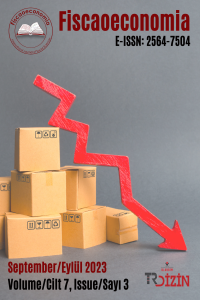Jeopolitik Risklerin ve Savunma Harcamalarının İktisadi Büyümeyle İlişkisi: MIST Ülkeleri Örneği
The Relationship of Geopolitical Risks and Defense Expenditures with Economic Growth: The Example of MIST Countries
Author(s): Onur Demirci, Fatih Volkan AyyildizSubject(s): Economic policy, Economic development, Geopolitics
Published by: Ahmet Arif Eren
Keywords: Geopolitical Risk; Military Keynesianism; Defense Expenditures; Economic Growth; MIST Countries;
Summary/Abstract: The high share of defense expenditures in GDP has a negative effect on growth in some economies. Supply-side economists argue that this effect should be eliminated by utilizing resources in more efficient and production oriented areas. The Keynesian view, on the other hand, argues that military spending can positively affect economic growth through the multiplier mechanism. This argument is based on the understanding that increasing defense expenditures will increase total expenditures, increase aggregate demand in total expenditures, and thus economic growth will gain momentum. Among the factors that cause this situation in countries with constantly high defense expenditures, geopolitical risks like war, earthquakes and immigration problems can be shown as examples for those expenditures. It can be observed that the defense expenditures of these countries with such risks have a relatively significant and high share in their respective GDPs. While there is extensive literature on the relationship between defense expenditures and economic growth in the economic literature, there are few studies that include geopolitical risks in this equation. This study aims to predict the existence of causality between geopolitical risks and defense expenditures and economic growth within the context of MIST countries (Mexico, Indonesia, South Korea and Turkey). Within the scope of the study, Dumitrescu & Hurlin’s (2012) panel causality test was applied by using the GPR index (Caldara & Lacoviello, 2022) for the measurement of geopolitical risks. The results obtained provide evidence of a causal relationship with feedback from economic growth to both variables, while also pointing to causality from geopolitical risk to defense spending.
Journal: Fiscaoeconomia
- Issue Year: 7/2023
- Issue No: 3
- Page Range: 1929-1947
- Page Count: 19
- Language: Turkish

